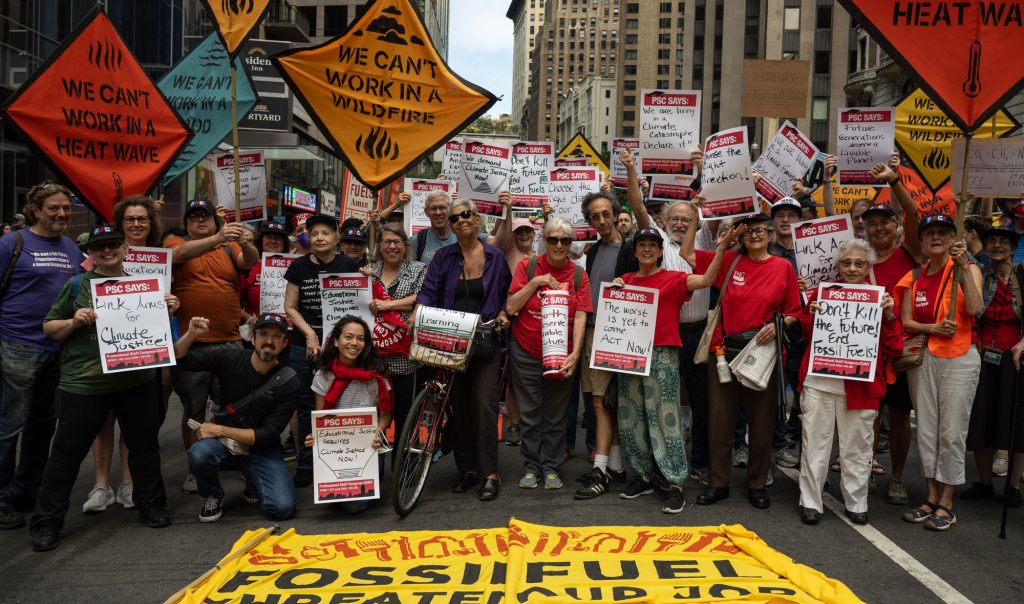
PSC members march at a climate justice rally in Manhattan. (Photo Credit: Scott Heins)
CUNY faculty, staff and students all know that our infrastructure is in terrible condition. Whether it’s dilapidated buildings, freezing or overheated classrooms, leaky roofs, rodent infestations, strange odors or dangerous conditions on our campuses, we’ve all experienced the infrastructural crisis. The CUNY Trustees agree, arguing in a recent report that “Only 8% of all CUNY buildings were found to be in ‘good repair.’”
But it’s not just that things are falling apart on our campuses. CUNY’s infrastructure is also contributing to the climate crisis. According to Inside Climate News (“When It Comes to Reducing New York City Emissions, CUNY Flunks the Test”), CUNY is one of eight city agencies that have seen emissions increase instead of decrease in recent years. From 2014 to 2019, carbon emissions intensity across a subset of 117 (out of 300-plus) CUNY buildings rose 15%, while in comparison, carbon emissions dropped 9.6% in other city government buildings. CUNY administration challenges those numbers and instead reports significant progress: an overall decrease in carbon output by 25% from 2006, before much attention was paid to the problem, to 2022, a much wider time period. This is promising, but we feel that CUNY’s decarbonization goals for the near future can and should be even more ambitious.
GOOD NEWS
The good news is that the new federal Inflation Reduction Act (IRA) provides billions of dollars over the next 10 years for decarbonization efforts, including those for public universities. The IRA will provide 50% or more of all funding for decarbonization projects, including replacing old carbon-spewing infrastructure with new renewable energy, solar roofs, geothermal networking, new energy-saving windows and microgrids, to name but a few of the game-changing upgrades covered.
We must not leave federal money to improve CUNY on the table. In addition to fixing many of our chronic infrastructural challenges and diminishing our collective carbon footprint, the upgrades that the IRA funds also mean a massive future decrease in CUNY’s utility bills.
More good news is that New York State enacted the Build Public Renewables Act (BPRA). This law, which our union had a hand in passing, empowers the publicly owned New York Power Authority to build and deliver renewable energy to public buildings, including CUNY.
As a result of the IRA and BPRA, CUNY has a unique opportunity to become a cutting-edge laboratory for rapid, planet-saving energy transition. We can be a model that the rest of the country – and many other countries, to boot – seek to emulate.
If we embrace this unique opportunity for change, it will mean safer, healthier environments for CUNY students, faculty and staff, and also for members of the communities surrounding CUNY campuses. Most of those communities are low-income, populated by people whose lives and health are significantly affected by their neighbor campuses. With CUNY campuses generating and storing clean power, we could establish neighborhood microgrids and district heating and cooling so that local communities benefit from the transformation we are helping to forge. Our campuses will become demonstration sites and job training facilities for clean power. This physical transformation can be fed back into our curriculum so that CUNY becomes an important site for pedagogical innovation around environmental justice, energy democracy and just transition.
SEIZE THE MOMENT
How can we seize this exciting opportunity? Members of the PSC’s Environmental Justice Working Group are working with the Public Power NY campaign to organize a series of town halls on CUNY campuses this coming autumn to help galvanize support for the CUNY clean power project. We have met with Mohamed Attalla, CUNY’s recently appointed vice chancellor for facilities planning, construction, and management, who has expressed strong support for this work. CUNY has developed an Energy Master Plan and is participating in the New York State Decarbonization Leadership Program focused on City, Hunter and Brooklyn Colleges. These are important steps that we applaud. But more political and popular push is necessary to fully decarbonize our campuses and create healthier working, learning and living conditions for our members, students and community residents.
MOBILIZE
We need to mobilize administrators and officials on each of our campuses to back this project, and we need to turn up the heat on the CUNY Board of Trustees so that this issue becomes a priority for them. We also need to put pressure on local and state elected officials to shake loose further funding for CUNY’s transformation. And we must make sure that the New York Power Authority and the Dormitory Authority of the State of New York (which does much of the building on our campuses) convene experts and resources to upgrade CUNY buildings to integrate renewables.
We are trying our best to educate our students to create a livable world that they can thrive in. We need to create livable campuses and laboratories to clean up our collective act through the smart use of federal funds and the know-how of state agencies. CUNY administration expects that most of our senior college campuses will reach the 2024 New York City carbon goals enshrined in Local Law 97, but they will have to sharply accelerate efforts to reach the 2030 requirements of the law. While increased capital funds from the state will go a long way, they won’t go far enough. But we’ve got federal help – through the IRA – and we’ve got the agency – NYPA – to make it happen. We can do this!
If you’d like to organize a town hall for the CUNY clean power project on your campus, please reach out to us at [email protected] and [email protected].
Ashley Dawson is a professor of English at the College of Staten Island and the Graduate Center. Nancy Romer is a professor emerita of psychology at Brooklyn College.
Published: May 19, 2024

